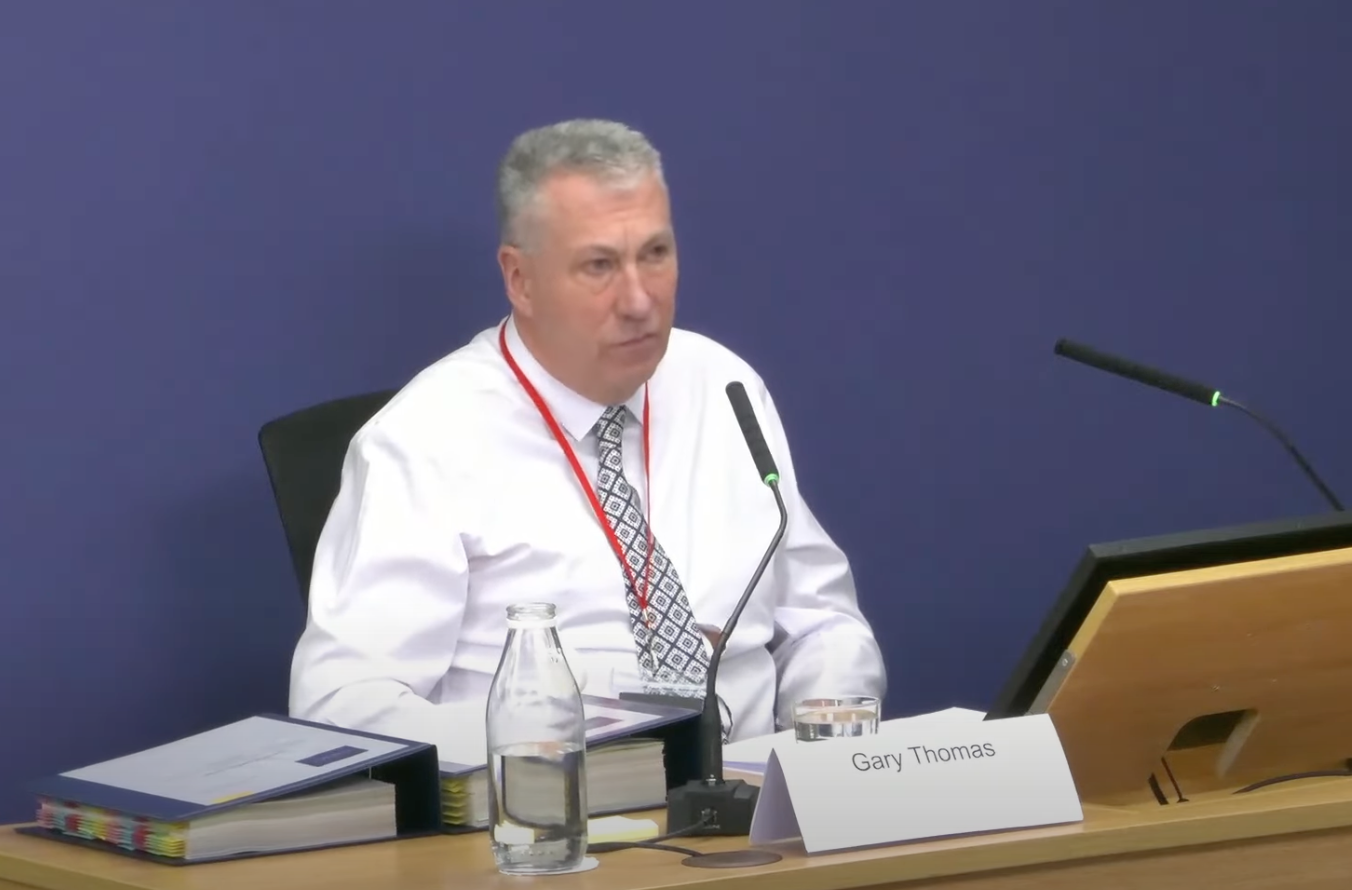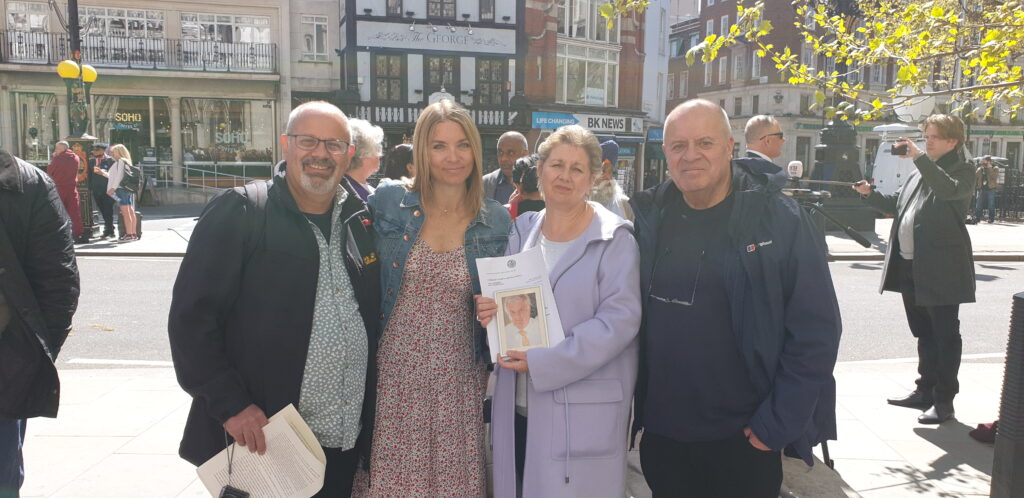
Let’s have a look at another one of the frontline plods who made it their business to investigate Subpostmasters and recommend them (or not) for prosecution based on what, at times, seems to be imaginary evidence.
Gary Thomas (and this will shock you) started his career in the Post Office as a counter clerk, rising to Crown Office branch manager, before joining the Security Team in 2000. He left in 2012. Thomas therefore worked at the heart of the Post Office’s investigation and prosecution complex for 12 of the 13 years it was prosecuting its Subpostmasters on the basis of Horizon evidence, without ever once bothering to find out for himself just how reliable this IT data was.
Thomas had no previous experience of criminal investigations before joining the security team, but a three week residential course soon put that right. Before long he was carrying out investigations of Subpostmasters. Thomas describes the remaining training he got from the Post Office to be “minimal”, but he didn’t need to worry about the Horizon IT system, because, he told the Inquiry (in hopelessly garbled language):
“everyone said the same, but line managers, colleagues, senior lead team manager, the business, was that we had somebody who would give a witness statement from Fujitsu that all the cases seemed to suggest that there was no product integrity [problem?] with Horizon.”
Despite everyone saying the same, Thomas could not explain how this idea originated. It was must have been in the air they breathed.
Millar time
In his witness statement, Thomas wrote about conducting interviews at police stations because the Post Office investigators were “a well-known recognised interviewing authority with the police”.
Megan Millar, the Inquiry barrister questioning Thomas, asked him in what way the Post Office Security unit was a “well-known recognised interviewing authority”. Thomas didn’t know. He’d just heard someone tell him they were.
Thomas couldn’t remember personally recommending Subpostmasters should be charged with criminal offences. Then he was taken by Millar to his witness statement, in which he recollects disagreeing with the hapless Jarnail Singh in one instance over Singh’s gung-ho prosecuting decisions. Thomas wrote:
“I challenged these charges as I had previously advised Mr Singh that there are no Branch Trading Statements available. Not only did I challenge the suggested charges but I also suggest that an appropriate charge under the Fraud Act 2006 should be considered.”
Was this, wondered Millar, evidence Thomas did have input into prosecuting decisions?
“Not that I recall, no,” he said, then appeared to reconsider. “Obviously I have written this… where I’ve managed to get the next bit from, of suggesting an appropriate charge, maybe I was digging from friends, colleagues, or management or something.”
Dodgy data
On the subject of making data requests of Fujitsu, Thomas admitted that even if a suspect Subpostmaster was blaming their discrepancies on dodgy figures from Horizon, it wasn’t a given that ARQ (audit) data would be requested from Fujitsu. Like all the investigators at the Post Office, Thomas held a “belief” that “shortfalls could not actually be attributed to Horizon”. Furthermore if he had requested ARQ data, Thomas was not qualified to understand it, telling Millar he was “self-taught”.
Despite being a Disclosure Officer on many of his investigations, Thomas had no real idea of what this entailed other than writing things down and filing them, or as he had it: “I was told you had to… you know, everything had a place, if that makes sense.” Actual disclosure didn’t seem to come into it.

Thomas was Lead Investigator in the case of Julian Wilson, who sadly died in 2016. Julian Wilson had his conviction for false accounting posthumously quashed in 2021. The Court of Appeal judges ruled:
“Evidence from Horizon was essential to Mr Wilson’s case. Based on the papers available from the criminal proceedings, there is nothing to suggest any ARQ data was obtained, the Post Office did not investigate any of the criticisms of Horizon made by Mr Wilson historically and during his detailed interview. There is no evidence to corroborate the Horizon evidence, there is no proof of an actual loss as opposed to a Horizon-generated shortage.”
What actual investigating was Thomas doing? Well, he searched Julian Wilson’s house (finding nothing), and did the “detailed interview”. The transcript of that has survived. During the interview Wilson started by raising the issue of problems with Horizon. He also told Thomas that he had reported them and said he had been told by his Federation rep of problems other Subpostmasters were having with Horizon.
Thomas responded that “those questions from postmasters weren’t founded in the Horizon system in that they’d been up to no good.” The garbled syntax, at least, is familiar.
Thomas admitted to Millar that making a comment like this during an interview with a Subpostmaster based on no evidence whatsoever was “completely wrong”. In fact, throughout his questioning at the Inquiry, Thomas readily accepted that he had been hopelessly misguided about a lot of his assumptions and appeared to come across as a humble, apologetic human being, “frustrated” that he did not have the tools in his locker to do a single proper investigation, trapped, as he was, in a web of somewhat moronic groupthink.
As Millar took him through the procedural oversights in Julian Wilson’s case, most of which had nothing to do with Horizon and a lot to do with an assumption Wilson was guilty (which became, due to Wilson’s guilty plea, a self-fulfilling prophecy), Thomas readily, almost enthusiastically, accepted his failures.
The best investigators they ever had
But just as Jarnail Singh’s attempts to portray himself as a witless victim were harpooned by contemporaneous documents, towards the end of Thomas’s evidence he was shown an email he sent a colleague in 2015 – six years after the formation of the Justice for Subpostmasters Alliance and two years after the Second Sight report which revealed flaws in the Horizon system. In the email (just published at my request by the Inquiry), Thomas tells his colleague he is “pleased” he has got his hands on electronic documents relating to Julian Wilson’s case. When his colleague asks why, Thomas replies:
“Because I want to prove that there is FFFFiiinnn no ‘Case for the Justice of Thieving Subpostmasters’ and that we were the best Investigators they ever had and they were all crooks!!”
At the Inquiry, Thomas accepted this was “disgraceful” and apologised to “absolutely everybody” because “I’ve labelled absolutely everybody, so I can’t defend it”.
No, but you wrote it.

I asked Karen Wilson, Julian’s widow, what she thought of Thomas’s evidence. She told me it made a change to hear from someone at the Post Office who wasn’t suffering from memory loss. She also credited Thomas with “honesty” and showing “some regret” for his actions. Then, said Karen:
“When the emails at the end of the evidence came up on the screen in respect of the “Case for the Justice of Thieving Subpostmasters” and that they were “all crooks” my doubts began to surface, as did my anger at what happened.”
She remembered Julian telling her about the “cruel interrogation” Thomas put him through, adding:
“I shall never ever forget the words said to Julian when the confiscation order was served upon us and we pleaded with the Post Office investigators as to how we would live and eat. We were told “live off the money you stole”. Sort of fits with the mindset that they appear to have had, doesn’t it?”
The various Post Office people we have heard from in recent weeks have been at pains to point out that if only someone had told them there might be problems with Horizon then everything would have been different. The reality, as evidenced by the contemporaneous documents, was that they were both malicious and incompetent. It was far easier to assume guilt and use their legal firepower to abuse the criminal justice system by pushing innocent but desperate people into a place where pleading guilty plea seemed like the least worst option.
Difficult and traumatic
There is a coda to the Thomas story. In 2021, four years after he left the Post Office and a couple of weeks after 39 Subpostmasters had their convictions quashed at the Court of Appeal, Gary Thomas wrote a quite extraordinary email to the Chief Executive of the Post Office, Nick Read. In his email (also just published by the Inquiry), Thomas said:
I was employed to carry out numerous roles over my 32 year career and a Post Office Security Manager was one of my roles I was employed in for around 10 years. During this time I carried out several criminal investigations interviewing suspected Criminal Offences by Postmasters along with my colleagues. This included PACE tape recorded interviews both voluntarily and following individuals being arrested and at Police Stations. The arrests were based on evidence both myself and colleagues would present to the Police stating the frauds were conducted through the Horizon Computer System. I now know that all this evidence was obviously flawed and without substance. The Post Office in my opinion therefore at the time blatantly lied and duped both me and colleagues into producing incorrect evidence to the Police, submitted committal papers to both the CPS and Post Office Law department that resulted in Criminal Trials and Prosecutions.
The past few years since this scandal has been brought to light under the “Justice For Postmasters” have been to say the least difficult and traumatic. I have to live with the fact I gave evidence under oath in several Courts swearing on the bible each time and now knowing this was incorrect and lies. My family and myself have been subjected to abuse and comments that I had given false evidence that was now proven to have been known yet hidden by the Post Office board of that time.
I took redundancy from Post Office Ltd in 2017 after 32 years loyal and committed service and now have to live with all this every day as do my other Security colleagues that I have recently spoken with. We even had a proceeds of crime unit within Post Office Ltd that ensured some of these individuals lost their homes and families. In fact my yearly objectives that were bonus worthy at the time were based on numbers of successful prosecutions and recovery amounts of money to the business. I had some instances of these Postmasters committing suicide, which now sits somewhat on my conscious because of my employer. How do you think I deal with this and now actually sleep at night now knowing my actions that were backed and supported by my employer has affected the said Postmasters but also the individuals you employed to conduct this role.
I am writing to you so you also realise the effect this has had on not just the Postmasters affected but also on the employees directed and instructed by their employer Post Office Ltd to perform the Security / Investigation role at this time.
Can I ask the question and enquire why we have all been completely cast aside and left with not so much as a letter of communication or an apology whatsoever ?
Whilst compensation is being correctly awarded now to these Sub-Postmasters, I feel the employees instructed to conduct these prosecutions, arrests and searches have been completely overlooked.
I will await your response before taking further advice from my Solicitor.
As the tiniest violins play for the “cast aside” investigators, consider the moral bankruptcy in awarding staff bonuses based on the number of successful criminal prosecutions and cash recoveries they make (corroborated in fellow investigator Dave Posnett’s evidence). No wonder Gary and his mates were keen to bang up the likes of Julian Wilson and steal all their assets.
Nothing has changed. This year the Post Office senior leadership team awarded themselves bonuses for the work they did assisting the public inquiry: cash in whilst you are creating a disaster, cash in as you watch it unravel.
And note that Thomas’s mask of righteous anger slips towards the end of the email, as something else comes to the fore. His cri de coeur of abuse and trauma has suddenly seemed to become a none-too-subtle demand for compensation. Is he also looking to screw a few more quid out of the scandal, this time via his former employer rather than the vulnerable Subpostmasters he considered “crooks”?
At the inquiry Thomas was keen to insist his letter had been misinterpreted by the Post Office (which internally called it “an attempt to negotiate a payment”), and that all he was after was an apology. Reading the contemporaneous document again… it doesn’t really look like it, mate.
Maybe Thomas is genuinely contrite about his role in harming so many others. If so, I wonder, other than sending a few self-pitying emails, what he’s actually done about it?
The journalism on this blog is crowdfunded. If you would like to join the “secret email” newsletter, please consider making a one-off donation. The money is used to keep the contents of this website free. You will receive irregular, but informative email updates about the Post Office Horizon IT scandal.

Leave a Reply